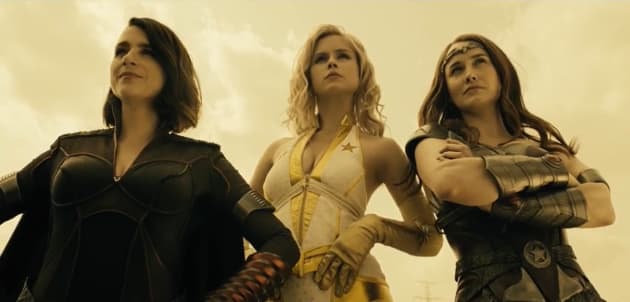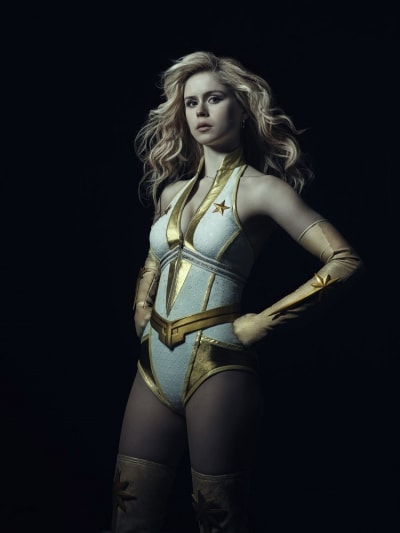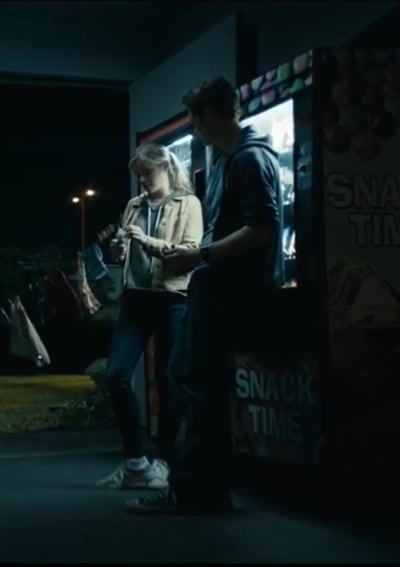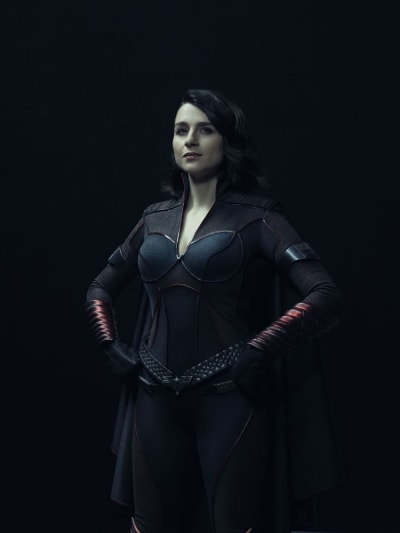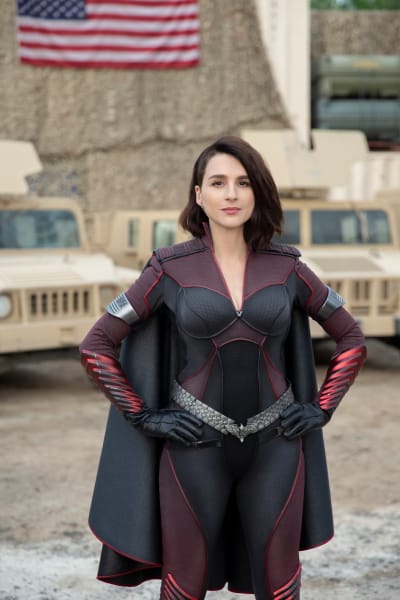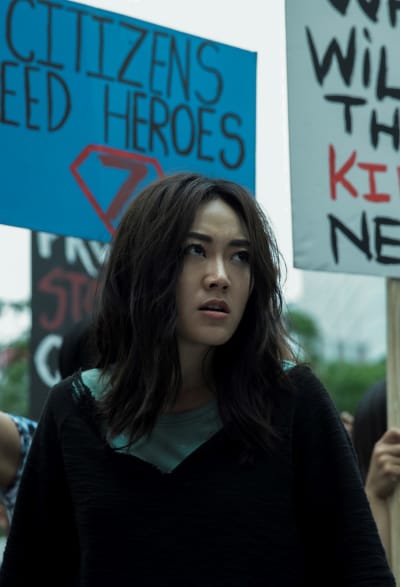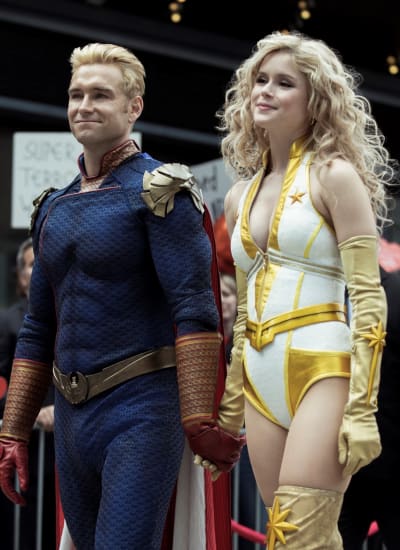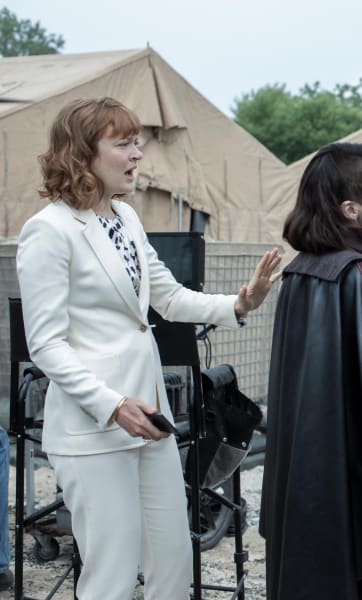On a series titled The Boys, the girls are very upfront and present.
The Girls represent many different facets of women in their careers and with their relationships with lovers, husbands, girlfriends, coworkers, the public, and family.
At a unique press day for the girls of The Boys, female reporters had the chance to sit with the influential women of The Boys to get their thoughts on the show and a whole lot more.
Among those present were Erin Moriarty (Starlight), Karen Fukuhara (Kimiko), Aya Cash (Stormfront), Colby Minifie (Ashley), and Laura Jean Shannon, of LJ Supersuits, all of which will be represented in this article. We’ll have another feature showcasing Shantel VanSanten, too.
At the forefront of The Boys Season 2, we find Starlight struggling with her place on The Seven and assisting Hughie and The Boys seek justice against that same group. It’s a struggle, Moriarty says because Starlight was conditioned her entire life to worship the Vought corporation, only recently discovering they were the opposite of that conditioning.
But that goes hand in hand with Starlight’s growth since the first season, both in confidence and in her relationship with her mother.
“Mother-daughter relationships are complicated, no matter what,” Moriarty said. “And I don’t think they’re portrayed enough in movies and TV shows. They’re one of the relationships that you just don’t see enough. So I do really like the inclusion of that storyline and that dynamic.
And in season two, I think a lot of it is that what happens to Annie is not unlike what happens to other people in terms of being kind of young and inherently naive because of how sheltered you’ve been up until the point when you fly the coop and be exposed to the world. Now she’s in an extreme circumstance.
“The world that she’s in is extremely dark, not darker than our world, because we have a pretty frigging dark world, but her specific world is more extreme and dark than mine, for example.
“But she goes through a trajectory that I think is quite common for a lot of young women, which is that, she has her first real love, I think, with Hughie. She had that trust totally severed and her heart broken by Hughie.
“She ends up finding out that her mom has been lying to her. She ends up finding out that the world is this big dark place when she thought it was a good place. She ends up finding out or thinking that maybe God doesn’t exist. And up until now, she’s been a really someone who’s based her life on faith. So, I think that she’s going through what a lot of young people go through.”
When asked about sacrificing their humanity to play with The Seven and support their separate agendas, Cash and Minifie weighed in.
Cash said, “Not much. I describe Stormfront as a heart full of acid, so she’s not exactly somebody that you want to find the cute, cuddly parts of; they’ve been wiped out probably long ago, but there are obviously moments that she has justification for herself.
“I don’t think those justifications actually pan out as an audience member. I hope they don’t, but for her, you have to follow her own story in how she thinks that she’s the hero of her own story. But the audience, I don’t think, should ever end up on her side.”
And while Ashley isn’t on equal footing with Stormfront either within the group of in terms of her transgressions, Minifie says, “There is a bit more of a window of opportunity for Ashley’s humanity to still be intact. I think she drives really hard and fast toward making sure the optics look good, no matter what sacrifices she has to make, to make that happen.
“And I think part of the stress that she’s under and the story of this season, hopefully, is maybe her coming to terms with what that means and what she’s sacrificing in order to make a corporation look good.”
If you’ve also wondered how Ashley, who initially seemed like a decent person, managed to wind up with the job from hell, Minifie has done some work with Ashley’s backstory.
“I do think that there is a part of Ashley that she is, she does have a lot of decent bones in her body, but she also has a narcissistic, pretty narcissistic bone in her body.
“And Kripke once described her well to me. And that she’s like the moon. She just wants to be reflecting off the sun all the time. And she got this job, and she had to make some sacrifices, some, probably, moral sacrifices to do a job where she is getting some of that shine from these superheroes.”
When it came to Starlight and Kimiko, the question changed somewhat, and I wondered about Moriarty’s and Fukuhara’s thoughts on their characters retaining their femininity through their more difficult or reprehensible actions.
Moriarty doesn’t feel that difficult actions and feminity have to be reconciled. “And sometimes they do things that are, especially in season one when Starlight submits to the sexual abuse, that would be deemed morally wrong.
“But I think that’s the whole point of the show is to show women that are at times doing dark things, making wrong choices, as we all do. And yet it doesn’t make them any less empowered. So for me, the femininity and difficult decisions did not feel mutually exclusive or difficult to keep both intact for me.”
Fukuhara said, “I think that’s a really interesting question because somehow, we have equated femininity to not being dark or violent, which is so weird because we’re all human beings, and we all feel the same thing. You know, if we’re put in the same situation, whether we are male or female.”
She continued, “I don’t think that it matters whether you are a female or not. If a male was put into Kimiko’s situation where you got kidnapped, torn away from your family, had done horrible things, [gotten] physically altered, and then they summon you to kill people, of course, you would have to do something about it.
“And violence was a way that she went, but male or female, I think it would have, it would have resulted in something very dark. So, yeah. I love that you asked that question because questioning the definition we put on feminism or being feminine, it should be talked about.”
People have been either for or against the weekly rollout of episodes for The Boys Season 2, but Cash sees it as a two-fold issue. “I think the weekly release has been harder for me but is better ultimately because the truth is that’s how the real world works is that we are often bamboozled by people who seem competent and charming, and that the cult of personality tends to win over content in our world.
“And so the experience of watching weekly is actually important. It’s just a little harder as an actor to not be able to talk about the entire story and to get into some of these larger conversations without spoilers and without the full context of the show.”
Similarly, Cash is grateful for the opportunity to play such a despicable character as she rises to the challenge and pushes herself to play someone so, as she calls it, disgusting. “I don’t think that she should be glorified in any way. It was very challenging.
“And the moments that I did connect to her, I also wanted to make sure that, in the arc of the season, we weren’t saying, well, because you understand this about her, that excuses anything, which is very different than a normally playing a character where I maybe would want to find the real reason behind and allow the audience to see that and understand her. I think understanding is fine, but you shouldn’t be on her side.”
Kimiko, too, has had a rather rough journey so far that got significantly darker when her brother reappeared and subsequently got killed. Fukuhara talked about her ability to go to some pretty dark places as an actor.
“It’s not a fun thing to do because, I guess, it’s so funny because we choose to do it. This is our profession, and we love doing it. We’re so passionate about it, but I must admit, those days are difficult.
“You don’t wake up thinking, ‘Oh yes, I get to do that scene where he dies,’ in preparation, I think I did a lot of digging into my like past and history and internal things. And then, at the end of the day, I think you can do so much preparation, but when you’re on set, you have to just let it go.
It’s all up to you and your scene partner. And I’m so happy that I got to work with Abraham Lim, who plays my brother. And we got along really well on set. And even when the cameras were rolling, we had this kind of a friendship that translated as sibling love on screen. And then that made the relationship very real, which made it easier for us to get vulnerable in front of each other, I think.”
Fukuhara is further challenged by her role since she portrays it all without using her voice, something she’s found quite fun and interesting to bring to life.
“I never realized that there are different forms of communication, and it’s not just me talking at someone and like really demanding something from someone. You can get what you want without uttering a word. Or, like, if you take the right kind of action, that is saying something.”
When asked how the show might be different if, instead of Kimiko and Starlight as part of The Boys, it was Butcher and Hughie as part of The Girls with their characters in charge, Moriarty said, “Whoa. I feel like we are in charge.
“I mean, Annie is definitely in charge of Hughie. Someone asked us before how we think the show would change if it were called The Girls. I think the women on our show are so badass. And I think if it changed to The Girls, it wouldn’t really change. I personally think it should be called The Girls.
And I do think, ultimately, and you get to see this very much at the end of the season, but I mean, that’s the whole concept behind this day, right? Girls do get it done.
“You see that in the end, and you realize, actually, it’s not if Kimiko and Annie were in charge because you realize that at the end of the day, it’s all kind of lying on their shoulders. And if you needed to rely on people to save the day, it’s always going to be the women of the show.
Fukuhara completely agrees. “I think, without giving too much away, especially in the finale, you’ll see that The Boys really need the girls. So I got to agree with Erin. We should just call it the girls from now on season three.”
Superhero suits aren’t the only costumes on The Boys, and Minifie gave a shout out to Rebecca Greg when asked about Ashley’s outfits and how they influence her performance. “I think Rebecca Greg deserves a huge shout out. She dressed me so well this season. She just put me in these amazing pantsuits.
“I was like, we’re channeling Hillary Clinton. I’m in. It completely changes how I walk and how I behave on that set when I put those suits on, because I’m like, jean shorts, goofy things. And then I get on set. I’m like, I’m the boss lady. And Rebecca Greg is the source of that.”
We also had a chance to chat with Laura Jean Shannon of LJ Supersuits, who is pretty much the superhero costume guru who brings all of your favorite shows to life with her gifts.
Now, find out what goes into the production of a supersuit with this exclusive video with Shannon.
And remember, new episodes of The Boys drop on Amazon every Friday into October, and we’ll have a full review of every episode along the way.
[embedded content]
Carissa Pavlica is the managing editor and a staff writer and critic for TV Fanatic. She’s a member of the Critic’s Choice Association, enjoys mentoring writers, cats, and passionately discussing the nuances of television and film. Follow her on Twitter and email her here at TV Fanatic.
